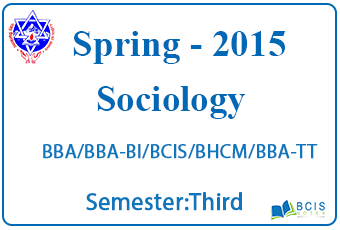
| Level: Bachelor | Semester –Spring | Year: 2015 |
| Programme: BBA/BBA-BI/BCIS/BHCM | Full Marks: 100 | |
| Course: Fundamentals of Sociology | Pass Marks: 45 | |
| Time: 3hrs. | ||
| Candidates are required to give their answers in their own words as far as practicable. |
| The figures in the margin indicate full marks. |
| Section “A”
Very Short Answer Questions Attempt all the questions. |
10×2 |
|
| 1. | What is the Scope of Sociology? | |
| 2. | Point out the basic assumptions of functionalism theory in 5 points. | |
| 3. | Show the functional relationship between social norms and value with examples. | |
| 4. | What is sexuality? Write with examples. | |
| 5. | Show the relationship between work and leisure? | |
| 6. | “Class is a dynamic system of social hierarchy and inequality”. prove | |
| 7. | What do you mean by ethnicity? Write with examples. | |
| 8. | What is an institution? List out four basic points that distinguish between institution and organization properly. | |
| 9. | Differentiate between patriarchal and matriarchal families. | |
| 10. | What are the four major impacts of education on social change? | |
| Section “B”
Descriptive Answer Questions Attempt any six questions |
6×10 |
|
| 11. | Define functionalism. How do Functionalists and Conflict theorists explain Social Change? | |
| 12. | What do you mean by sociology? How it is important to understand business management? | |
| 13. | Introduce the industrial society. Differentiate between pre-industrial and industrial society. | |
| 14. | What do you mean by Socialization? Discuss the types of Socialization with its theory. | |
| 15. | Discuss the concept of social stratification. Is social class stratification beneficial to society? | |
| 16. | How functionalist and Conflict approach analyze education as a social institution? | |
| 17. | What is Social Change? Discuss Technology as a key factor in social change. | |
|
18. |
Section “C”
Case Analysis Read the following passage and give an answer accordingly There is a village, named Hasnapur in Rupandehi district, a rural area, composed of 400 household with a population of 1200 persons. Most of the people who lived there were Tharu and Musahars. About 60 percent of the people who lived there were farmers, 20 percent work in town, 15 percent work in foreign employment, and 5 percent working as a vendor. Most of the households are plotted along with small canals named Karmahawa. In general, the villagers looked healthy. People did not consider themselves sick till they were able to work. There were two outbreaks of malaria in the past causing a few deaths. Tuberculosis and intestinal diseases were fairly prevalent but were rarely cause of death. Folk healers and traditional medicine were common means of treatment of illness among the villagers. However, a health center was somewhat 4 km away from the village. One day a three-year-old girl got sick with Japanese Encephalitis (JE). Her parents, who were farmers after an initial period of apparent unconcern, consulted with their neighbors and were taking some traditional medicine. A week later, the small son of a town (Butwal) workers’ family contracted with the same disease. His parents rushed him to the hospital in town. The child treated by the folk healer died and the child who went to the hospital was cured. Local administrative and health officers were alert by this event and arranged for an emergency immunization program. The villagers were informed to take their children for JE vaccination on a certain date. The message from the District health officer was given to the VDC Chairperson who in turn asked his relatives to inform the villagers. On the day of vaccination, the response was spotty and patently inconsistent. It was found that most of the families around the houses of the child who was survived the disease came for vaccination, the rest were not interested. Questions: 1. Why did the farmer’s family react to the disease and seek treatment different from the town worker family? 2. What was behind the uneven response to the call for immunization? 3. If you will be the hospital administrator, what will you do to introduce the immunization program into the community? 4. As a student of Sociology, if you will be the national policymaker & planner, what type of development policy and program would you make to enhance the health consciousness in rural areas? Discuss with scientific justification. |
20 |
You may also like: Sociology || Spring 2016 || Pokhara University

Leave a Reply